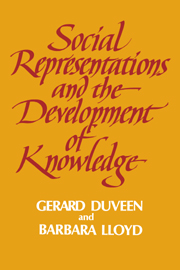Book contents
- Frontmatter
- Contents
- List of figures
- List of tables
- List of contributors
- Acknowledgements
- 1 Introduction
- 2 The underlife of the nursery school: young children's social representations of adult rules
- 3 A semiotic analysis of the development of social representations of gender
- 4 Children's representations of social relations
- 5 Social representations of childhood: an implicit theory of development
- 6 What is in an image? The structure of mothers' images of the child and their influence on conversational styles
- 7 The acquisition of reflexive social emotions: the transmission and reproduction of social control through joint action
- 8 From social cognition to social representations in the study of intelligence
- 9 Prototypes of the psychologist and professionalisation: diverging social representations of a developmental process
- 10 Social psychology and developmental psychology: extending the conversation
- Author index
- Subject index
2 - The underlife of the nursery school: young children's social representations of adult rules
Published online by Cambridge University Press: 08 March 2010
- Frontmatter
- Contents
- List of figures
- List of tables
- List of contributors
- Acknowledgements
- 1 Introduction
- 2 The underlife of the nursery school: young children's social representations of adult rules
- 3 A semiotic analysis of the development of social representations of gender
- 4 Children's representations of social relations
- 5 Social representations of childhood: an implicit theory of development
- 6 What is in an image? The structure of mothers' images of the child and their influence on conversational styles
- 7 The acquisition of reflexive social emotions: the transmission and reproduction of social control through joint action
- 8 From social cognition to social representations in the study of intelligence
- 9 Prototypes of the psychologist and professionalisation: diverging social representations of a developmental process
- 10 Social psychology and developmental psychology: extending the conversation
- Author index
- Subject index
Summary
Introduction
There has been a definite trend in theoretical work on human development towards the acceptance of what has been termed a constructivist approach. This view, which is most often associated with the theoretical work of Piaget (1968), stresses the active role of the child, arguing that children interpret, organise and use information from the environment and, in the process, construct mature skills and knowledge. Although these developments are clearly in the right direction, they still cling to what Harré (1986) referred to as the doctrine of individualism.
An adherence to individualism is evident in two respects. First, understanding of children's interactions remains at an interpersonal level; interpersonal alignments (for example, adult–child versus peer) are contrasted to show how they differentially affect individual development. But how interpersonal relations reflect cultural systems, or how children, through their participation in communicative events, become part of and collectively reproduce these interpersonal relations and cultural patterns is not seriously considered. Second, the adherence to individualism is also seen in the overwhelming concern with the endpoint of development, or the movement from immaturity to adult competence. For example, work on social cognition focusses on identifying stages in the abstract conception of friendship. Children's conceptions are elicited through clinical interviews and their underdeveloped conceptions are compared to those of competent adults (Selman, 1980; Youniss, 1980). Yet, few scholars study what it is like to be or have a friend in children's social words or how developing conceptions of friendship get embedded in peer culture.
- Type
- Chapter
- Information
- Social Representations and the Development of Knowledge , pp. 11 - 26Publisher: Cambridge University PressPrint publication year: 1990
- 23
- Cited by



